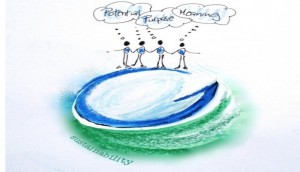I’ve been reflecting on the meaning and purpose of sustainability departments and have come to the conclusion that there is a great opportunity to evolve – and step-change – the role it plays in the organizational context.
In business we come across several different definitions of sustainability, ranging from: “minimizing the negative harm on the global or local environment”, to resiliency over time – ie, “the ability to survive shocks because it is intimately connected to healthy economic, social and environmental systems”.
In all instances, the term ‘Sustainability’ implies working within the current paradigm in order to maintain its current position, or minimize exposure to external risks. At the moment sustainability initiatives are not designed to fundamentally change or transform the organization into a new paradigm.
Here’s the question that is arising for me: In a social, economical and political context, where the status quo is increasingly deemed unsustainable (as evidenced by all-time low levels of employee engagement and corporate trustworthiness), why would we want to strengthen or SUSTAIN the current paradigm (even when done “responsibly”)?
Everywhere I look today I see two different stories of how the world is evolving.
THE PREDOMINANT NARRATIVE
The predominant narrative, largely supported by the mainstream media, advocates sustainability. It suggests that all the problems we face (war, environmental degradation, social inequality…) can be addressed by strengthening and reinforcing the current power structures. For example, to overcome the threat of terrorism we simply need to increase security and fight back by reinforcing existing institutions like the NATO, or to counter the ill effects of corporate greed we need to strengthen regulatory bodies and impose stricter rules. These solutions might be fine in environments where the status quo is considered sustainable. However, in the current context we need to define the problems more holistically, see the interconnectedness of issues and respond to them with more integrated solutions that address all stakeholder needs.
Let’s look at an example closer to home. Most organizations will agree that the current level of employee motivation and engagement are unacceptable and significantly limiting an organization’s ability to thrive in the future. However, the solutions that are being proposed today (mostly extrinsic motivators such as pay and other benefits) do not adequately address the root cause of the problem. At best they maintain the status quo, but interventions at this level will never lead to the breakthroughs we are looking for.
Employees today are yearning for a sense of purpose and meaning. They aspire to bring their unique gifts and talents to work and feel valued for who they are as human beings instead of their latest achievements. Addressing the root cause of low employee engagement is of course much more complex to manage, but when this human dimension of business is brought back to life, then the potential rewards are also enormous (breakthroughs in innovation, customer satisfaction, trustworthiness…).
THE ALTERNATE NARRATIVE
Working within complex environments – where the solutions have more to do with inner shifts of perspective than external fixes – is the essence of the alternative narrative that is emerging (mainly on social media and other alternative media sources). In this story we acknowledge that the status-quo is not sustainable, and we recognize that the problems we face will never be resolved at the same level of consciousness at which they were created. In other words, our mindsets – or the way we look at the world – needs to shift before we can truly embrace new ways forward.
For some of us, mainly the younger generation (ie., millennials) this is happening naturally. They easily sense into situations, intuitively understand the root causes of the problem, and imagine the kind of integrated solutions that are needed. They effortlessly see through eloquent words and feel into the purity of intentions. This sensitivity makes it more and more difficult for policy-makers (in business or politics) to say one thing and do another.
For the rest of us this process of evolving/upgrading our mindsets can be hard work with a lot of healing and vulnerability involved.
THE WAY FORWARD
We are faced with a time of tremendous opportunities. Organizations can once again become the change-agents of new social, economic and environmental orders. Sustainability departments can become truly relevant by becoming the locus of new contracts; contracts that help society and environment thrive.
This process involves sensing into these new opportunities and asking certain crucial questions;
- What would the new role of the sustainability departments look like and how can they play a role in helping organizations move beyond the unsustainable status quo?
- What are the new mindsets and competencies Sustainability departments must embrace in order to shift policy-making and create the conditions for a world that truly works for all?
- How would the Sustainability department create sufficient openness and curiosity for people to question their existing beliefs and assumptions about the way things are”?
- How do we harness the natural ability of the Millennial generation to challenge the status quo, envision new possibilities and champion change initiatives within organizations.
Many of the above questions – and more – is what we will be exploring during the Summit for Human Potential Realization – new mindsets for elevating the “People P” of Sustainability, this coming September 19th to 21st in Baarlo, The Netherlands. Event information and registration details

